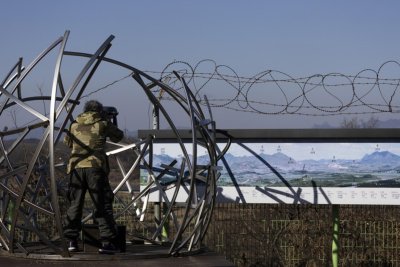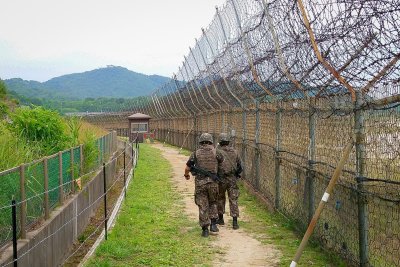South Korea in talks with UN Command on DMZ management

A man looks through binoculars toward the North Korean side of the border from the Tongilchon Village near the Demilitarised Zone (DMZ) in Paju, Gyeonggi-do province, South Korea, 25 December 2025. According to South Korea’s Joint Chiefs of Staff (JCS), North Korea launched a test firing of new anti-air missiles toward the East Sea on 24 December. File. JEON HEON-KYUN / EPA
Feb. 6 (Asia Today) — South Korea’s Defense Ministry said Thursday it is consulting with the United Nations Command on ways to manage the Demilitarized Zone more effectively.
A ministry official told reporters that discussions on improving and streamlining DMZ management have been under way at the working level since early this year, following the inauguration of Defense Minister Ahn Kyu-baek.
Media reports earlier indicated that the ministry has proposed a revised jurisdictional arrangement within the southern section of the DMZ. Under the proposal, areas north of the existing fence would remain under the UN Command’s authority, while areas south of the fence would be managed by the South Korean military.
The DMZ extends 2 kilometers south of the Military Demarcation Line, forming the southern DMZ zone. Although the fence was originally intended to follow the Southern Limit Line marking that boundary, it was installed slightly farther north to facilitate surveillance and guard operations against North Korea.
As a result, the area south of the fence accounts for about 30% of the southern DMZ zone, according to the ministry.
The Defense Ministry is expected to raise the issue of DMZ management formally with the U.S. side, which holds command authority over the UN Command, later this year. Officials said Seoul has also proposed addressing the issue through bilateral defense consultative frameworks, including the Korea-U.S. Integrated Defense Dialogue and the Security Consultative Meeting.
The ministry emphasized that discussions with the UN Command remain at an early, working-level stage. “We will provide further explanations as talks progress,” the official said.
— Reported by Asia Today; translated by UPI
© Asia Today. Unauthorized reproduction or redistribution prohibited.
Original Korean report: https://www.asiatoday.co.kr/kn/view.php?key=20260206010002476


